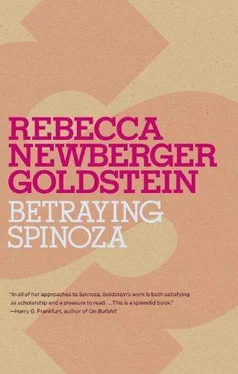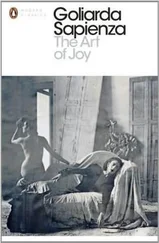Rebecca Goldstein - Betraying Spinoza - The Renegade Jew Who Gave Us Modernity
Здесь есть возможность читать онлайн «Rebecca Goldstein - Betraying Spinoza - The Renegade Jew Who Gave Us Modernity» весь текст электронной книги совершенно бесплатно (целиком полную версию без сокращений). В некоторых случаях можно слушать аудио, скачать через торрент в формате fb2 и присутствует краткое содержание. Год выпуска: 2009, ISBN: 2009, Издательство: Random House, Inc., Жанр: Биографии и Мемуары, на английском языке. Описание произведения, (предисловие) а так же отзывы посетителей доступны на портале библиотеки ЛибКат.
- Название:Betraying Spinoza: The Renegade Jew Who Gave Us Modernity
- Автор:
- Издательство:Random House, Inc.
- Жанр:
- Год:2009
- ISBN:978-0-80524273-7
- Рейтинг книги:5 / 5. Голосов: 1
-
Избранное:Добавить в избранное
- Отзывы:
-
Ваша оценка:
- 100
- 1
- 2
- 3
- 4
- 5
Betraying Spinoza: The Renegade Jew Who Gave Us Modernity: краткое содержание, описание и аннотация
Предлагаем к чтению аннотацию, описание, краткое содержание или предисловие (зависит от того, что написал сам автор книги «Betraying Spinoza: The Renegade Jew Who Gave Us Modernity»). Если вы не нашли необходимую информацию о книге — напишите в комментариях, мы постараемся отыскать её.
Betraying Spinoza: The Renegade Jew Who Gave Us Modernity — читать онлайн бесплатно полную книгу (весь текст) целиком
Ниже представлен текст книги, разбитый по страницам. Система сохранения места последней прочитанной страницы, позволяет с удобством читать онлайн бесплатно книгу «Betraying Spinoza: The Renegade Jew Who Gave Us Modernity», без необходимости каждый раз заново искать на чём Вы остановились. Поставьте закладку, и сможете в любой момент перейти на страницу, на которой закончили чтение.
Интервал:
Закладка:
( Halakha means “Jewish law.” The term derives from the Hebrew root of the verb “to go,” and so connotes the right way to go. The sources of halakha are basically three. There are the 613 commandments — or mitzvahs — that are contained in the Torah, the work that is traditionally considered the “Written Law,” the author the divinely directed Moses. Then there are the writings in the classical rabbinical sources that are the discussions and debates about the written laws, especially in the Mishnah [referred to as the Oral Law, by tradition taught by Moses and passed down through the ages until it was written down in the third century c.e.] and the Gemorah [which is rabbinical commentary on the Mishnah, the first version authored in Jerusalem in the fifth century; the second, which is the one more commonly studied, authored in Babylonia in the sixth century]. The Mishnah and the Gemorah together comprise the Talmud. And then, third, there is the codified law as it is laid out in the Shulkhan Arukh , a work whose title literally means “The Set Table,” composed in the sixteenth century by the Sephardic kabbalist Joseph Karo. The Shulkhan Arukh culls from all the Talmudic discussions and controversies and sets forth [as in a set table] the redacted halakha . Orthodox Judaism is, for the most part, governed by the Shulkan Arukh , which is interesting since mainstream Judaism rejects the kabbalistic approach that was the [suppressed] inspiration for Karo’s work. To quote the great secular kabbalist scholar Gershom Scholem, “R. Joseph Karo deliberately ignored kabbalism in his great rabbinic code Shulkhan Arukh , yet there is little doubt as to the secret eschatological motives of its composition.” 9)
It’s not that the rabbis didn’t have rakhmones (pity) for these victims of persecution, Mrs. Schoenfeld explained, but it required a stern hand to pull them back into true Yiddishkeit .
Da Costa had been put in kherem not once, but twice. Both times he had begged the community to allow him back, and they had granted him this, once he had fulfilled the terms of his penance. However, eventually he committed suicide — he seems to have been meshugga , a lunatic— and this had been a terrible shock and tragedy for the community, as you can well imagine. And then, at the time of Spinoza’s excommunication, there was another man, older than Spinoza but his friend, a Spanish doctor by the name of Daniel de Prado, who also was excommunicated for questioning the basic beliefs of Judaism. He, too, was allowed to make his penance.
For everyone else the ban of excommunication had included ways in which the person in question could repent and have the ban removed when the allotted period was up. Baruch Spinoza’s kherem was declared permanent, with no possibility of his returning to the Jewish community. His offense was seen as being far deeper than any of the others’, perhaps because the young man’s arrogant behavior at the synagogue had shown the rabbis and parnassim that he was incapable of t’shuva , repentance.
When a messenger came to where he was now living with his non-Jewish friend and brought news of his excommunication to him, Spinoza reportedly said to him, “All the better; they do not force me to do anything that I would not have done of my own accord if I did not dread scandal; but, since they want it that way, I enter gladly on the path that is opened to me.” 10
And what was this path, girls? Later he would publish his ideas and he would make the entire world angry — the Christians, too. The worst of his works he couldn’t even publish when he was alive. This was called The Ethics , and it was in this work that he would say that God is nothing but nature and he would deny that there is any moral truth beyond our own pleasure and he would deny that we have free will to choose what we do, and he would argue that there is no world-to-come when we stand before the Throne of Glory and are judged for the lives we lived here on earth. His false ideas were against every religion, not just Judaism.
Spinoza didn’t convert to any other religion. There had been Jewish apostates before him, those who converted to Christianity or Islam. But a Jew who believed in nothing at all? This was a new phenomenon. This is why he is called the first “modern Jew.” This, girls, is what “modernity” means: believing in nothing.
Unfortunately it would be a Jew, at least someone who had been born a Jew, who would take goyisha philosophy much further than it had ever gone before into godlessness and immorality. It would be a Jew who would make philosophy into one long argument against the existence of God and against the difference between right and wrong, so that philosophy, girls, has been, ever since modernity, the most dangerous subject that you can possibly study.
Once again I felt reluctantly compelled to ask a question. It seemed so glaringly obvious that I waited for someone else to ask it, but since no one did, I had to: If he didn’t believe in ethics, then why did he name his book The Ethics ?
It was his malicious sense of irony, answered my teacher, with the linguistic facility that so delighted me. Just as he had taken on the name Benedictus after his excommunication, since Benedictus means “blessed” in Latin as Baruch means “blessed” in Hebrew, with that same cynicism he would call this book of his The Ethics . But there is nothing ethical about the book. Spinoza goes out of his way to deny that there is anything like the true knowledge of good and evil that the Torah gives us. The ideas in this book were so irreligious and unethical, not only for Jews who wouldn’t have read him anyway, but also for Christians, that he never dared to publish it during his lifetime.
Did he ever publish anything? another student asked.
Yes, he did. While he was still working on The Ethics , he broke off for a few years in order to write another book, which he did publish, although anonymously. But it became known who the author was and all those who had a fear of God, Christian people, condemned him. On the title page he listed a fictitious author. 11But once again nobody was fooled by his sly tricks. Everyone who read it — who of course were only non-Jews, since the kherem forbade that any Jew read Spinoza’s works — immediately guessed who the real author was. That’s how notorious he had already become, how much shame he had already brought on the Jews.
Are Jews still forbidden to read Spinoza?
I remember how strangely she looked at me when I asked her this question (provoked partly out of my wondering whether my teacher had read Spinoza herself). I remember thinking, as she stared at me for several long seconds before answering me, that she liked neither me nor my questions very much. The discovery upset me, since she was by far my favorite teacher.
The kherem against Spinoza has never been rescinded, she said, impressing me once again with her mastery of the English language (I’d read words like “rescinded” but never heard anybody use them), even as her tone of voice foreclosed further questions along these lines. I understood her to be saying that yes, Jews were still forbidden to read this philosopher’s works, an answer that upset me almost as much as the discovery that my favorite teacher didn’t like me.
The roots of this treatise that he published under a false name went back to his kherem . Right after he was excommunicated, he had started to write, in Spanish, what is called an apologia, defending his ideas. You should understand, though, girls, that even though such a work is called an apologia, there was going to be nothing apologetic in the work. No t’shuva , no remorse. We know this because instead of publishing his so-called apologia, he eventually turned his ideas into this treatise, written not in Spanish, which was the language that the Portuguese Jews often used for scholarly and literary works, but rather in the goyisha Latin. This treatise vindicated the two former friends of his who had first brought the charges against Spinoza. His treatise showed that all the rumors and suspicions about him had been justified. The treatise was a twisted perversion of all that his rabbis had tried to teach him. Spinoza denied that there could be any sort of prophecy or revelation. He denied that miracles were possible. He claimed that the Torah didn’t come from Ha-Shem , that it hadn’t been dictated by Ha-Shem to Moshe Rabbenu, but rather that it had been written by several men over an extended period of time and that it suffered from internal inconsistencies.
Читать дальшеИнтервал:
Закладка:
Похожие книги на «Betraying Spinoza: The Renegade Jew Who Gave Us Modernity»
Представляем Вашему вниманию похожие книги на «Betraying Spinoza: The Renegade Jew Who Gave Us Modernity» списком для выбора. Мы отобрали схожую по названию и смыслу литературу в надежде предоставить читателям больше вариантов отыскать новые, интересные, ещё непрочитанные произведения.
Обсуждение, отзывы о книге «Betraying Spinoza: The Renegade Jew Who Gave Us Modernity» и просто собственные мнения читателей. Оставьте ваши комментарии, напишите, что Вы думаете о произведении, его смысле или главных героях. Укажите что конкретно понравилось, а что нет, и почему Вы так считаете.












